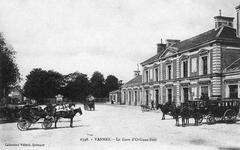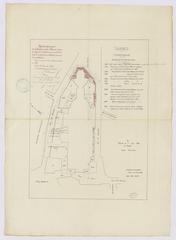Saint-Jean Gate Vannes: Visiting Hours, Tickets, and Historical Significance
Date: 14/06/2025
Introduction
Nestled in the heart of Brittany, France, the Saint-Jean Gate (Porte Saint-Jean) in Vannes is a striking monument of medieval military architecture and a living symbol of the city’s storied past. Originally constructed in the Middle Ages, this formidable gateway once served as a crucial entrance, overseeing access from the countryside and safeguarding the thriving town within. Today, the Saint-Jean Gate stands largely intact—its robust granite structure, defensive machicolations, and evocative setting offering visitors a rare and immersive glimpse into Brittany’s medieval heritage. This guide provides a comprehensive overview of the gate’s history, architectural features, visiting information, and tips for making the most of your journey through Vannes’ enchanting old town (Cityzeum, 2SuitcasesFor2Years, Along Dusty Roads).
Table of Contents
- Medieval Origins and Strategic Importance
- Architectural Features
- Historical Events and Preservation
- Visiting Information: Hours, Tickets, Tours, and Accessibility
- Visitor Experience and Practical Tips
- Nearby Attractions
- Local Events and Seasonal Highlights
- Frequently Asked Questions
- Conclusion and Recommendations
- References
Medieval Origins and Strategic Importance
Vannes, strategically located at the head of the Gulf of Morbihan, has been fortified since Roman times. The earliest defenses date back to the 3rd century CE, when walls were erected to shield the settlement from Saxon raids. Throughout the Middle Ages, as Vannes grew in political and economic importance—particularly as an administrative center for the Duchy of Brittany—its fortifications were expanded and reinforced.
The Saint-Jean Gate was among the most important of these defensive structures. Positioned on the northern perimeter, it controlled the vital route between the countryside and the walled city, regulating commerce and ensuring the safety of the population. The gate’s alternative name, “Door of the Executioner,” reflects its proximity to the Executioner Tower, where condemned prisoners received their last rites—a poignant reminder of the city’s judicial history (Cityzeum, 2SuitcasesFor2Years).
Architectural Features
The Saint-Jean Gate
The Saint-Jean Gate exemplifies medieval military architecture. Its pointed granite arch, thick stone walls, and remnants of machicolations (openings for dropping projectiles) speak to its defensive function. The passageway was deliberately narrow and low, enabling defenders to control access during times of siege or unrest. The surrounding ramparts, connected to the gate, extend in a circuit around the old town, punctuated by towers and additional gates (mymagicearth.com).
Integration with the City
Immediately beyond the gate, visitors find themselves immersed in Vannes’ atmospheric old town—cobbled streets, timber-framed houses, and vibrant squares. The gate stands near other historical landmarks, including the Executioner Tower and the Cathédrale Saint-Pierre, weaving together the city’s military, civic, and religious narratives.
Historical Events and Preservation
The fortifications of Vannes, including the Saint-Jean Gate, played pivotal roles during regional conflicts such as the Breton War of Succession. Over the centuries, the walls were modified to adapt to advancements in siege technology. Despite the turbulence of history, Vannes’ old town escaped major destruction in the 20th century, preserving its medieval identity. Restoration efforts in recent decades have focused on maintaining the integrity of the gate and its surroundings, using traditional materials and techniques (Cityzeum, 2SuitcasesFor2Years).
Visiting Information: Hours, Tickets, Tours, and Accessibility
Visiting Hours
- Saint-Jean Gate: This open-air monument is accessible at all times; there are no official opening or closing hours. For safety and optimal viewing, daytime visits are recommended (trip101.com).
- Ramparts and Jardin des Remparts: Generally open year-round from 9:00 AM to 6:00 PM, though hours may vary seasonally.
Tickets
- Saint-Jean Gate: Entry is free; no tickets are required.
- Guided Tours and Exhibitions: Fees may apply for guided tours or special exhibitions at nearby museums. These can be booked at the Vannes Tourist Office or online (thegoodlifefrance.com).
Guided Tours
- Tours lasting 1–2 hours are available through the Vannes Tourist Office. These include historical explanations and access to select areas of the ramparts. Tours may be offered in English and French.
Accessibility
- The gate and its immediate surroundings are pedestrian-friendly. Cobblestones and occasional steps may challenge visitors with limited mobility; sturdy footwear is recommended.
- For accessibility information, contact the Vannes Tourist Office.
Facilities
- Restrooms and cafés are located near the city center and main gates.
- Free maps and walking guides are available at the tourist office (thegoodlifefrance.com).
Visitor Experience and Practical Tips
What to See and Do
- Walk the Ramparts: Follow self-guided routes, marked by bronze plaques, to explore the city’s fortifications.
- Photography: Early morning and late afternoon offer the best lighting for photos.
- Nearby Dining: Enjoy Breton specialties such as crêpes and cider in the old town’s cafés (alongdustyroads.com).
- Market Visits: Don’t miss the market at Place des Lices for local produce and atmosphere (france-voyage.com).
Getting There
- By Train: Vannes is a TGV stop; the gate is a 15-minute walk from the station (alongdustyroads.com).
- By Car: Parking is available near the old town at lots like Parking du Capucines (solosophie.com).
- By Bus: Public transport stops near the city center.
Safety
- Vannes is considered safe, with well-lit and frequented public areas. As always, remain mindful of personal belongings during busy periods (solosophie.com).
Best Times to Visit
- Late Spring and Early Autumn: Mild weather, fewer crowds.
- Summer: Popular for festivals and lively city life.
- Events: Check the calendar for markets, concerts, and seasonal festivities (thecrazytourist.com; actu.fr).
Nearby Attractions
- Cathédrale Saint-Pierre: A Gothic cathedral with impressive stained glass and organ concerts.
- Jardin des Remparts: Tranquil public gardens along the city walls.
- Château Gaillard: A 15th-century residence housing local history exhibits.
- Saint-Patern District: Characterful neighborhood with artisan shops and historic church.
- Half-Timbered Houses: Over 170 preserved medieval residences in the old town (golfedumorbihan.co.uk).
- Port de Plaisance: Picturesque harbor with cafés and boat tours.
Local Events and Seasonal Highlights
- Fête de la Musique (June): Live music throughout the old town.
- Photo de Mer (May): Outdoor photography exhibitions.
- Christmas Markets (December): Festive atmosphere with local goods.
- Free Summer Concerts: At Le Kiosque à Musique in Place de la République.
- Traditional Markets: Every Saturday at Place des Lices (france-voyage.com).
- Check local event listings for updated schedules (AllEvents, JDS Vannes).
Frequently Asked Questions
Q: What are the visiting hours for Saint-Jean Gate?
A: The gate is an open-air monument accessible 24/7. Visiting during daylight hours is recommended for safety and visibility.
Q: Is there an entrance fee or tickets required?
A: No, visiting Saint-Jean Gate is free and does not require tickets.
Q: Are guided tours available?
A: Yes, guided walking tours can be booked via the Vannes Tourist Office.
Q: Is the gate accessible for those with mobility challenges?
A: The area is generally accessible, though cobblestones and some steps may present challenges. Contact the tourist office for accessible routes.
Q: When is the best time to visit?
A: Late spring and early autumn for mild weather and fewer crowds; summer for vibrant festivals.
Conclusion and Recommendations
The Saint-Jean Gate is a remarkable portal into Vannes’ medieval heritage, freely accessible and surrounded by a wealth of historical, architectural, and cultural attractions. From strolling the ramparts and exploring bustling markets to savoring Breton cuisine and joining guided tours, this site is an essential stop for any visitor to Brittany. To enhance your experience, download the Audiala app for interactive maps and self-guided tours, and consult the Vannes Tourist Office for up-to-date event information.
Begin your journey through Vannes’ living history at the Saint-Jean Gate—where every stone tells a story and every street invites discovery.
References
- Cityzeum – Vannes Guide
- 2SuitcasesFor2Years – Road Trip Through Brittany: Josselin, Vannes
- MyMagicEarth – Vannes Old Town
- Along Dusty Roads – Things to Do in Vannes
- Solo Sophie – Vannes, France
- The Crazy Tourist – 15 Best Things to Do in Vannes
- JDS Vannes – Agenda
- The Good Life France – What to See and Do in Vannes
- France Voyage – Vannes Tourism
- Golfedumorbihan.co.uk – Visit Vannes
Alt text: Saint-Jean Gate, a granite medieval city gate in Vannes, Brittany.
View map of Saint-Jean Gate and nearby attractions
Explore more about Vannes’ medieval charm in our related articles on Vannes Ramparts and Half-Timbered Houses of Vannes. Follow us on social media for the latest travel tips and updates.

